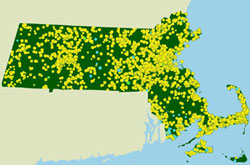Under Governor Patrick, Massachusetts has risen to the most energy efficient state in the US, and now Boston has been identified as the most efficient city by the American Council for Energy Efficiency (ACEEE).
Boston got 76.75 out of a 100 possible points and is closely followed by Portland, Oregon (70 points) ; New York City (69.75); San Francisco (69.75); Seattle (65.25) and Austin, Texas (62). The next tier of cities are Washington DC, Minneapolis, Chicago, Philadelphia and Denver, all scoring above 50 points.
Boston scored high on each category: Community Initiatives, Buildings, Transportation and Energy/ Water Utilities programs. Its Renew Boston program is particularly notable, says ACEEE.
"What’s exciting is the quickening pace of these efforts, lead author Eric Mackres told USA Today. "Over the past five or so years, cities are rediscovering how important energy efficiency is to their economies," spurred by the federal Recovery Act which gave them funds to test potential solutions.
Leading cities have:
- City-wide efficiency goals with systems that track progress;
- Stringent building energy codes, backed by enforcement and incentives, and requirements for reporting; and significant programs to make energy upgrades easy.
- On transportation, policies focus on smart growth development and multi-model transport from bikeshare programs to investment in public transit and programs to transition to efficient vehicles and freight infrastructure.
- Strong partnerships with utilities that promote and expand energy efficiency programs.
ACEEE makes the point that all cities have lots of room to become much more energy efficient.
In May, Boston became the eighth city to require buildings to report on energy and water use each year.
Massachusetts Charges Ahead
The state’s four utilities are pooling resources to buy 565 megawatts (MW) of renewable energy for the state from six projects in Maine and New Hampshire. The contracts will supply 170,000 Massachusetts homes and came in under $0.08 per kilowatt hour as a weighted average – cheaper than coal and nuclear is expected to be several years out at $0.10 and $0.11 respectively.
Utilities are buying the energy because of a 2012 state law that requires them to jointly sign long term contracts that provide 4% of the energy supply from renewables.
"By pooling the resources of all the utilities, we are able to purchase a large amount of renewable energy for the state at below-market prices," says Ronald Gerwatowski, senior vice president, U.S. Regulation and Pricing, National Grid.
Governor Patrick announced that renewable energy jobs have grown 24.4% in the past two years and there are now 5557 local businesses employing almost 80,000 people.
Solar in Massachusetts is growing impressively:

The overwhelming majority of job creation over the past year comes from new entrants into the sector, including startups, the government’s 2013 Massachusetts Clean Energy Industry Report says. The industry is growing eight times faster than other industries in the state.
As a comparison, this is twice the natural gas jobs in Pennsylvania and even more than the 64,000 jobs the fracking boom has created in North Dakota.
This year, the state reached its goal of 250 megawatts (MW) of solar four years early, and it upped the solar target to 1600 MW by 2020. The state ranks #6 in the nation for solar.
Here is the ACEEE’s Executive Summary:

